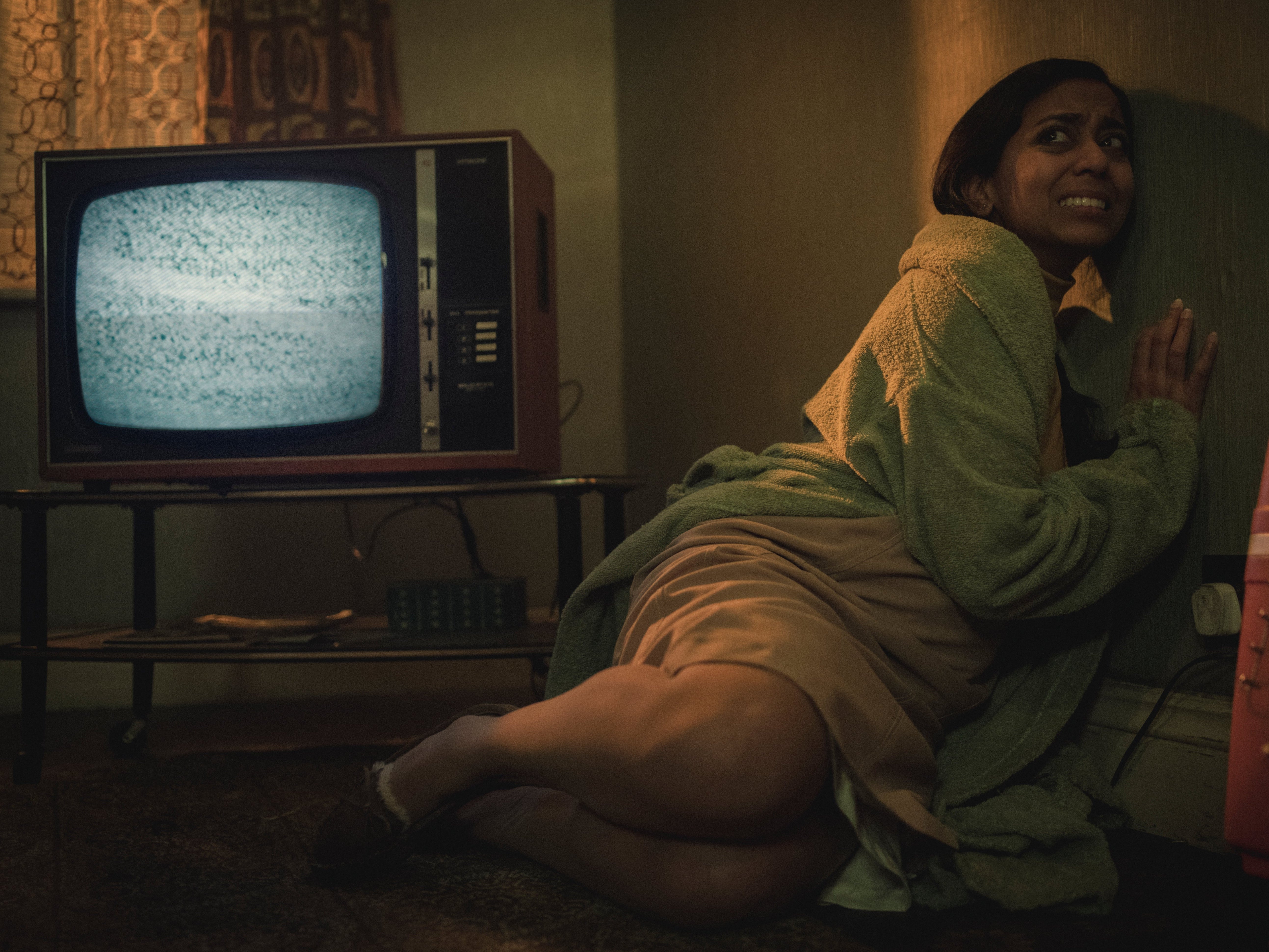Black Mirror’s Anjana Vasan: ‘I’ve been underestimated because I’m small, brown and foreign’
The award-winning star of ‘A Streetcar Named Desire’ tells Ellie Harrison about subverting stereotypes, and playing a reluctant serial killer in Charlie Brooker’s dystopian anthology thriller


Anjana Vasan likes surprises. The Olivier-winning actor is drawn to characters who do the things you least expect. In the Channel 4 sitcom We Are Lady Parts, she played a nerd who forms a punk band with a group of Muslim women. To land the part, she bit the head off a flower in the audition – and ended up with a Bafta nomination. In A Streetcar Named Desire, which recently finished its West End transfer, she starred as Stella – a character often perceived as passive and feeble but who actually holds considerable power and sway over her sister and husband. And now, in Black Mirror, she portrays a meek shoe shop assistant who starts bludgeoning people to death with bricks and hammers.
“There is a pattern,” the 36-year-old says, looking quite pleased at the connection. “They are characters where you maybe underestimate what they’re capable of, or there’s something that doesn’t match who they are.” She’s speaking over video call from her north London home; a black tail belonging to her cat, Pirate, flicks near the corner of the screen. Vasan pauses as she thinks about why she chooses these roles. “I am someone who people have maybe underestimated,” she says. “Being someone who’s quite small, you know, and brown and foreign – in many situations I have felt that feeling of being underestimated. And I do take some relish in proving people wrong.”
Initially, Vasan thought it was a mistake when she was asked to record a self-tape for the new Black Mirror episode, “Demon 79”. “I had a small little part in [season three’s] ‘Nosedive’ years ago, so I thought I’d already had my Black Mirror moment,” she says. “I almost didn’t do the self-tape. I just had it in my head that I wasn’t going to get it, or that if they found out I was in one episode already they probably wouldn’t cast me.” But they did, in the role of a young Indian woman called Nida who works in a shoe shop in the north of England. Her quiet life becomes quite the racket when Paapa Essiedu pops up as a demon in the body of a cockney disco diva, telling her she must make three human sacrifices in the next three days or the apocalypse will come.
Creator Charlie Brooker is showing his funny bones with this story, and rather than being set in a dystopian future, the action takes place in 1979, against a backdrop of bad wallpaper and the rise of nationalism. It’s also very analogue for a Black Mirror episode – yes, there’s a talisman that beckons devil-like creatures to Earth, but there aren’t any robotic dogs or memory microchips. Vasan, despite wearing a drab dressing gown and scuffed slippers throughout, is captivating as a young woman simmering with repressed rage.
One of the objects of her wrath is Michael Smart. He’s a local Tory politician, played with a shovelful of smarm by David Shields, who represents the latent racism that lurks in some corners of right-wing politics. He’s just as xenophobic as the National Front thugs who stalked the streets with “STOP IMMIGRATION” signs at the time, but he wears a tailored suit. “When he says what he says, I think he’s just a different face, a more palatable face, a more charismatic face,” says Vasan. “He may not say those things in capital letters, but it doesn’t mean that he doesn’t believe in the same things.”
Nida encounters relentless microaggressions from her colleagues at the shoe store. One girl wrinkles her nose in disgust when Nida eats a biryani on her break in the stockroom. And she’s repeatedly referred to as “your sort”. Vasan, who was born in Chennai, India, and grew up in Singapore from the age of four, has experienced similar prejudice herself. “I’m an immigrant, like, twice over,” she says. “I know what it feels like to be the outsider person in the situation. When I was young, people would go, ‘Oh, your hair smells like curry.’ You don’t really realise how horrible that is until a bit later on. You sort of assume that you’re the one who’s different, so of course they’ll comment on you. You’re the one who’s not from here. If someone said that to me now, I would have something to say – I don’t know that my younger self would. But we now seem to have a better vocabulary for those things, we have words like ‘microaggressions’. Even 10 years ago, and certainly in 1979, you didn’t have that.”
In Black Mirror, Nida’s boss asks her to bring in something “normal” for lunch, so she promises him she’ll take a cheese sandwich next time. “When you think about that first generation, second generation of people who moved from another place to England, they just take it on the chin because they almost expect it,” says Vasan. “Nida is a character who wakes up, goes to work; she’s just trying to get by. She doesn’t have any huge ambitions in life, she’s literally trying to survive. For someone like her to work as a sales assistant in a department store is actually kind of a big deal, in a very tiny town in the north of England. Sometimes she’s just trying to blend into the background – literally, in her all-brown outfit. She looks exactly the same as the department store.”
Vasan, on the other hand, hasn’t been afraid to stand out. None of her relatives work in the performing arts (the family moved to Singapore for her father’s job in finance), and she says that “like any immigrant parents”, hers were “a little bit concerned” about her choice to go into acting. They have nevertheless always “cheered me on from the sidelines”, she says. Vasan did theatre studies at the National University of Singapore, then moved to Cardiff to attend the Royal Welsh College of Music and Drama, without ever having set foot in the UK before. “I escaped some of the drama school horror stories I’ve heard from other people,” she says, laughing. “No one is trying to break you down when you’re just there for a year.”

After she left the Royal Welsh, Vasan moved to London and had her first meeting with a theatre casting director. “They were being really lovely and very nice to me, but then at some point they just stopped me and went, ‘How do you speak English so well?’ I just went, ‘What?’ In this day and age, that question just seems so...” she trails off, shaking her head. “That wasn’t someone trying to offend or upset me, it was just an assumption about me because I’m not from here... they just couldn’t get past that difference.”
Vasan very much considered herself a theatre actor, and the subsequent years saw her star in plays from Rebecca Frecknall’s acclaimed revival of Tennessee Williams’s Summer and Smoke to playing Nora in an adaptation of Ibsen’s A Doll’s House that moved the action to colonial India. She was surprised when she started getting TV roles too – she’s played an abortion protestor in Sex Education and an assassin in Killing Eve. And then came Stella, the role that won Vasan the Olivier. Frecknall’s Streetcar revival, also starring Paul Mescal, was one of this year’s hot tickets. In a four-star review for The Independent, Jessie Thompson wrote that Vasan’s reading of Stella was “smart” – “living for the electricity between her and Stanley but increasingly wary of when the fuse might blow”.
But before the first run at the Almeida even began, the London theatre publicly apologised for failing to include an image of Vasan, and also misspelling her name, in a Facebook advert for the show. Vasan remembers the fallout vividly. “When that happened, within 24 hours, I was getting lots of messages about it,” she says. “And then it just escalated and a lot of people were very upset and angry on my behalf. I was disappointed and I spoke to the Almeida, and they were very transparent about it and dealt with it.” She pauses. Sighs. “Here’s what I feel. I feel like that sort of thing becomes very defining, because it blew up in a way that meant I knew that one day someone would ask me about it in an interview like this. For me, because we hadn’t even started the job yet, that’s not what I wanted. I didn’t want to be defined by that failing on their part. That’s what was upsetting about it, it was feeling like, ‘I want to be known for playing Stella in this production. I don’t want to be known for this incident.’ It’s a distraction from the work. And when these things happen, people start to chime in on whether Stella should have been included or not included, like, ‘Is she important enough?’ But they’re not useful conversations.”

At the time, Vasan tweeted to thank those who had voiced their support, saying: “It’s tiring when despite our work and achievements, a simple thing like being credited properly is still not a given.” “I didn’t want to tweet about anything,” she says now, “but I was overwhelmed by the sheer number of people who wanted to reach out to me. These oversights, yes, they can be an honest mistake, but they tend to always happen to certain types of people, and I didn’t want to dismiss how people reacted to it. But I’m happy to say that my experience of the play has not been that little moment. I hated that happening because I knew that at some point it was going to come up again in conversation... but people of colour, we don’t want to be defined by these incidents and these events, we want to be defined by the work that we do.”
After that rocky start, the show’s first run at the Almeida was fraught. Lydia Wilson, who was meant to play Blanche, had to drop out due to health reasons. Vasan, meanwhile, lost her voice before press night and had to miss a show. She says she was mostly ill for the rest of that run. “I felt genuinely quite wiped out by it all at the very end,” she says. “At the West End, it was nice to be able to just do the show, not under crisis all the time.” It all paid off – but she was knackered. In her acceptance speech at the Oliviers, she was so overwhelmed she told the crowd: “I’m going to find a corner and have a lie-down and a cry.”
Up next, Vasan is starring alongside Olivia Colman and Jessie Buckley in Wicked Little Letters. The comedy film is based on the true story of a group of women investigating a strange case, namely who is sending the 1920s residents of Littlehampton scandalous and obscene correspondence. Vasan plays a cop who’s trying to solve the mystery. "A woman police officer was a very new concept in England at the time," she says, a hint of pride in her voice. And there she goes, surprising us again in a role that breaks the mould.
‘Black Mirror’ season six is out now on Netflix
Join our commenting forum
Join thought-provoking conversations, follow other Independent readers and see their replies
Comments


Bookmark popover
Removed from bookmarks